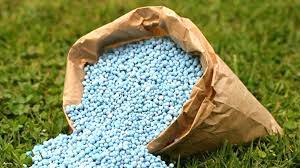Chris Mahove
The government has suspended duty on the importation of certain quantities of fertiliser for the 2021/2021 cropping season.
According to a government gazette published this week, Urea fertiliser, whether or not in aqueous solution and mixtures of urea and ammonium nitrate in aqueous or ammoniacal solution with a ring-fenced allocation of 75 000 metric tonnes will be exempted from payment of duty.
Ammonium nitrate whether or not in aqueous solution with a 150 000 metric tonnes ring-fenced allocation will also have payment of duty suspended under the newly enacted Customs and Excise {Amendment } Regulations 2021 {No 251}.
The regulations were made by the Minister of Finance ans Economic Development, Mthuli Ncube in terms of section 235 read with section 120 of the Customs and Excise Act Chapter 23:02.
“The customs and Excise {Suspension} Regulations , 2003 published in the Statutory Instrument 257 of 2003 are amended in section 9 {T} {suspension of duty on fertiliser imported by approved importer} by the insertion in the first schedule of the following-“Quantity of fertiliser eligible for suspension of duty-summer crop 2021-2022 season,” read part o the notice.
Previously under the customs and Excise {Suspension} Regulations , 2003 published in the Statutory Instrument 257 of 2003, the duty waiver was only extended approved importers of fertiliser.
Local fertiliser companies have been struggling to meet demand owing to the shortage of foreign currency need to import raw materials, which has seen a slump in production volumes.
Three of the largest fertiliser producing companies, ZFC, Windmill and Sable Chemicals recently told a parliamentary portfolio committee on Agriculture that the foreign currency allocation they were getting from the foreign currency auction floor was not enough to meet their demands.
The lifting of the suspension of duty on the importation of fertiliser, will enable bulk importers to sufficiently provide the input for the 2020/2021 season and hopefully translate to better yields tha will make the country self-sufficient.
However, the lifting of the suspension will run the risk of swelling the country’s import bill at a time the country is pushing for 30/70 import to export ratio.
There is therefore, need for the government to formulate deliberate policies that will ensure the capacitation of local fertiliser companies and others in the manufacturing sector so the country could cut on its import bill.
Government should also provide subsidies as a way of encouraging purchasing of locally manufactured l fertilisers and other inputs so that local manufacturers improve their capacity utilisation.













